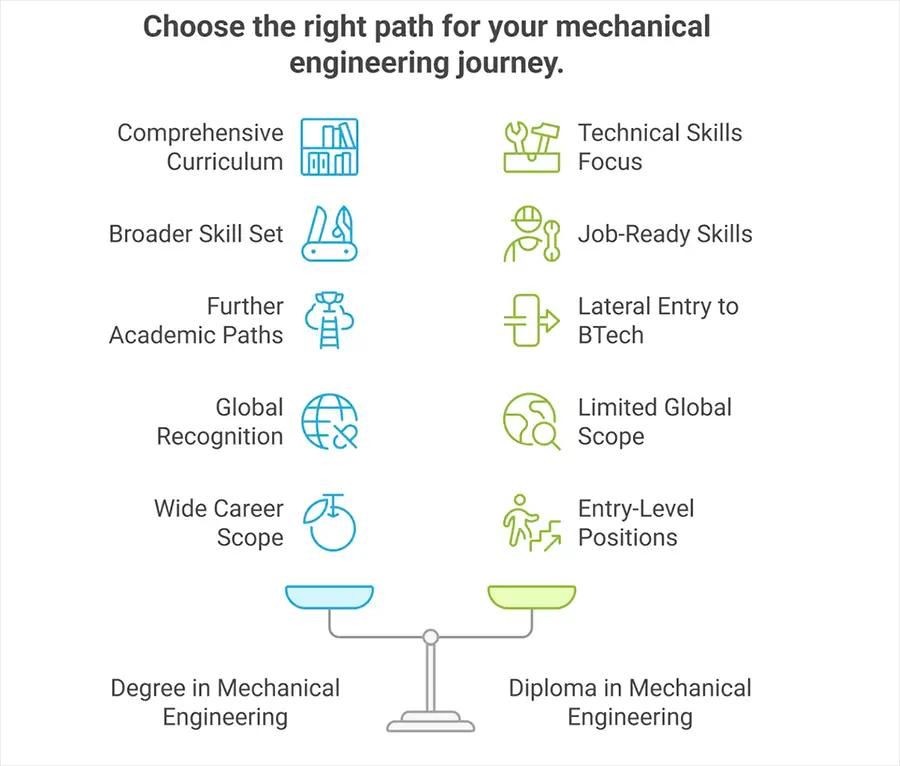Explore Courses
Top University

Isha
31 July, 2025
Table of Contents
Are you at the crossroads of whether to pursue a diploma or a degree in mechanical engineering? Finding the right path is a significant decision. It can hugely impact your career’s trajectory. Whether you choose a mechanical engineering diploma or a degree, the goal is to gain skills and qualifications crucial in the industry.
The choice to select between a degree and diploma in mechanical engineering can be dependent on many different factors, such as course duration, fee, and career goal. In this blog, we shall discuss both a mechanical engineering degree and diploma, along with their different features. Furthermore, this blog would help you make an informed decision for your future. So, let’s take a deep dive into a diploma and a degree in mechanical engineering.
A degree and a diploma both offer diverse work opportunities. However, one provides an extensive view of the mechanical engineering industry, while the other offers practical skills and limited technical knowledge. Check out the table below to understand the unique points and differences between a diploma and a degree.
| Aspects | Diploma in Mechanical Engineering | Degree in Mechanical Engineering |
|---|---|---|
| Course Duration | 3 Years | 4 Years |
| Focus | Technical skills and industry-focused training | Fundamental and advanced theoretical knowledge and skills in the field |
| Job Roles/Opportunities | Limited technical positions, entry-level roles | Advanced engineering roles, Broader opportunities |
| Cost | Comparatively less | Generally higher |
| Who Should Choose? | Ideal for those looking for a quick entry into the workforce. | Ideal for those who are looking for a long-term professional career in the field. |
| Salary Range | INR 1.80 LPA – INR 2.64 LPA | INR 1.0 LPA – INR 7.0 LPA |

A mechanical engineering degree can be referred to as a B.Tech. This Bachelor of Technology is a four-year course that offers a combination of a practical and theoretical approach. In addition to the book-based knowledge, you would gain practical skills crucial in the industry. The degree in mechanical engineering offers a comprehensive programme structure, practical labs, internships, simulations, and more.
A diploma in mechanical engineering is a three-year course. This course solely focuses on skills. From basics to advanced, you would learn by doing. The programme covers installation, maintenance, and troubleshooting of machines. It offers a mix of foundation and core subjects. In comparison to a degree, a diploma is short. These skills would open a direct entry into technical roles.
To be eligible for a degree in mechanical engineering, you must have passed 10+2 from a recognised board with a science stream. The minimum score you must aim for a mechanical engineering degree is 50% in mathematics, chemistry, and physics. On top of this, you must have scored qualifying marks in the entrance exams such as JEE Mains, CUET (UG), and MET.
For a diploma in mechanical engineering, you must make sure that you pass the 10th grade with a minimum 50% score and from a recognised board. Please keep in mind that this is a general eligibility criteria; it is subject to change depending on the institute.
A four-year degree programme in mechanical engineering offers a comprehensive curriculum. It includes theoretical knowledge and practical skills. The mechanical engineering degree subjects cover areas such as design, production, mechanics, kinematics, thermodynamics, structural analysis, and more. Moreover, the course includes hands-on practical projects and simulations.
A diploma in mechanical engineering subjects focuses on technical skills only. It can fast-track your career in the industry. The curriculum covers the study of mechanical parts and devices. It includes design, analysis, manufacturing, and maintenance of mechanical machines.
A BTech degree in mechanical engineering focuses on a broader skill set. It shall equip you with employable skills crucial to navigating the work ecosystem. Master essential technical and soft skills to thrive in a professional setup. From innovation to critical thinking and leadership, a BTech shall prepare you for the industry. Furthermore, the BTech curriculum makes it mandatory to do an internship, giving you the necessary practical experience.
A diploma programme in mechanical engineering shall equip you with technical skills. These skills would make you job-ready for entry-level positions. If you wish to enter the workforce immediately, then a diploma is for you. Some of the entry-level job roles are junior engineers, lab technicians, technical assistants, and more.
After a BTech degree, you can pursue a variety of master’s degrees, like MTech. The master’s degree can also be followed by a PhD. Additionally, you can also pursue an MBA if you wish to switch to managerial or leadership roles. A master’s is an excellent choice to unlock career growth opportunities.
However, a diploma does not directly qualify you for a master’s programme. After a diploma, you would become eligible to enrol in a BTech course with lateral entry. Only once you have completed your BTech can you apply for postgraduate programmes and further pursue a PhD.
A mechanical engineering degree can open a broader range of global career and research opportunities. Not only would your educational degree be recognised in other countries, but also enhance your credibility in the global job market. Furthermore, a BTech degree offers you greater opportunity to build a global network.
A diploma in mechanical engineering does not open many global opportunities. While you can pursue additional certifications with your diploma, you can gain more employable skills in the field. It is important to note that many countries might not recognise your diploma in mechanical engineering. This is why it is advised to check before you look for career opportunities in the country.
With a degree in mechanical engineering, you can find a wide variety of career opportunities. From research and innovation to consulting and developing, a BTech can be your gateway to job opportunities across industries. If combined with employable skills, the average package after your BTech can be on the higher side.
A diploma in mechanical engineering is a three-year course which can help you enter the workforce early on. Some of the most common roles include technical and operational positions across various industries. Typically, the salary after a diploma in mechanical engineering is on the lower side as compared to a degree. However, the salary range can change with experience and advanced certifications.
If you wonder which is better, diploma or degree in Mechanical engineering, note that it depends on career goals. Selecting the right engineering path is a personal choice; it must be dependent on your career goals, interests, and preferences. If you would like to enter the job market with technical roles, then a diploma is the way to go. But if you want to focus on career development and innovation, then a BTech would be a better choice.
A diploma in engineering aligns with your choices if you are looking for a head start on the career front. However, you must note that the roles would be limited to technical and operational only. However, a degree in engineering provides holistic growth. It can open a diverse range of career and research avenues for you.
Both a mechanical engineering degree and a diploma are valuable options. The choice must be based on your career goal, responsibilities, and finances. However, these options can result in a successful career. If you want a detailed understanding of mechanical engineering, then a BTech could be a better choice. In this blog, we take you through the key differences between a diploma and a degree in mechanical engineering. This blog would help you make an informed and effective decision for your future. Get ready to make the best choice for your future. If you have already made up your mind, then go ahead and enrol. Because the time is now!
A diploma in mechanical engineering uses a technical approach. It uses a practical approach to provide technical and operational skills. Whereas a degree in mechanical engineering provides a comprehensive view of the industry. From theoretical knowledge to practical skills, you would get everything. The diploma is a three-year course, while the degree requires four years.
Selecting the right engineering path is a personal choice; it must be dependent on your career goals, interests, and preferences. If you would like to enter the job market with technical roles, then a diploma is the way to go. But if you want to focus on career development and innovation, then a BTech would be a better choice.
The final choice should depend on your career goals, interests, finances, and preferences. Both these courses offer viable career options.
A degree holder earns more than a diploma holder. The salary range for a diploma holder is INR 1.80 LPA – INR 2.64 LPA. Whereas a degree holder can earn anywhere between INR 1.0 LPA – INR 7.0 LPA.
Our team of experts, or experienced individuals, will answer it over online meet. Book your slot now!
Book Free Online CounsellingGet Free Career Guidance
